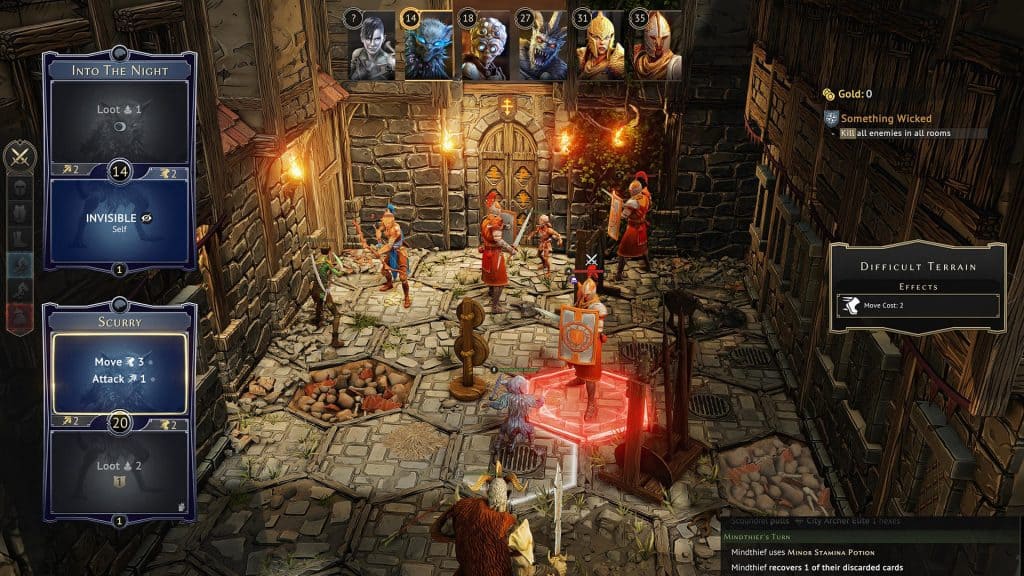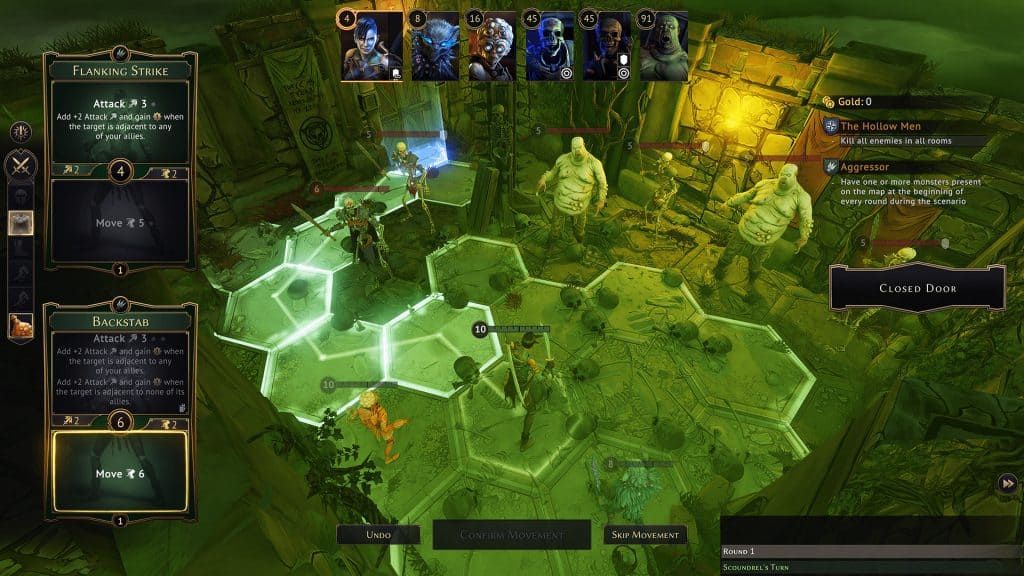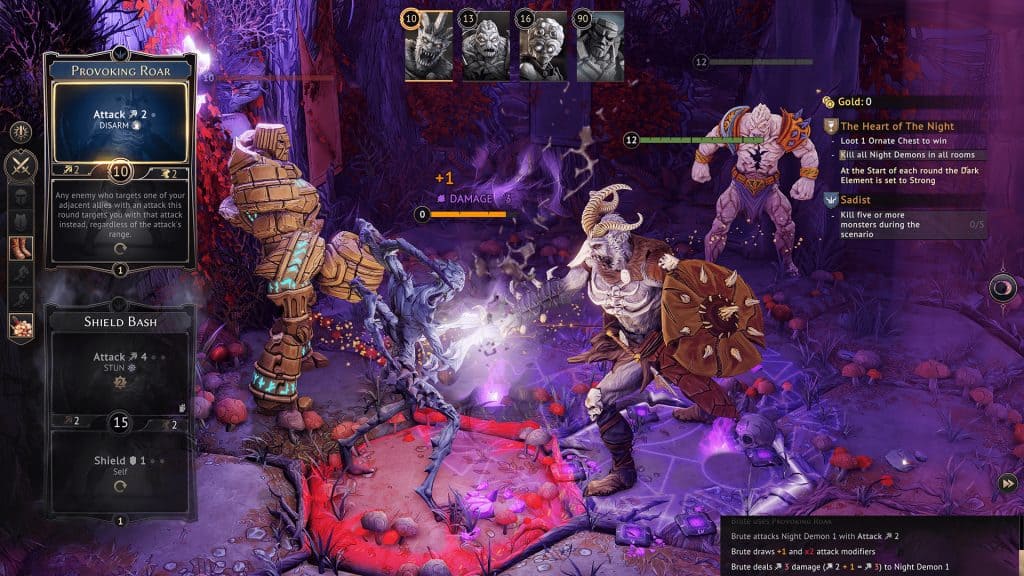Gloomhaven is one of the best tabletop games of all time. It’s a perfect blend of several genres, play styles, and experiences. I had weekly play sessions where we’d knock out a couple of encounters, expand our world, and have a great time.
Then Covid happened and made it a little difficult to play in-person together.
While there was always the option to play via Skype, there were several logistical issues that ultimately made such a thing impractical. First and foremost, the Gloomhaven experience is fairly large. The game requires several boards and maps for the overworld and dungeon, as well as hundreds of pieces for characters, damage indicators, and more. Plus there were several decks of cards that needed to be juggled.
Simply put, it just wasn’t practical.
Now, a digital version of Gloomhaven is available from developer Flaming Fowl Studios and Publisher Asmodee Digital. It’s been a long time in the making, having been in Early Access for a couple of years. It finally saw its official, full release for PC on October 20th, and macOS on November 25. While the Early Access period was rough around the edges, the full release is a near-perfect transition from the tabletop to the digital realm.
Gloomhaven Improves the Tabletop Rpg Formula
Before discussing the digital version specifically, we need to explain exactly what makes Gloomhaven so great. In terms of an elevator pitch, it’s akin to Dungeons & Dragons, but without dice. Players are mercenaries that act on behalf of the town of Gloomhaven. Your abilities will depend on one of the various “classes,” for lack of a better term, you select. For example, you can be a (essentially) mage, tank, or rogue. The game does a great job of not only adding uniqueness to each character role but also avoiding falling into the trap of the typical tropes found in similar games.
It’d be nice to have a “traditional” tank and healer set up, but Gloomhaven’s combat and scenarios also don’t really necessitate the need. If you’re falling into the trap of thinking these roles are necessary, chances are you’re just bumping into one of the game’s first roadblocks. The initial scenarios aren’t always the easiest thing in the world; Gloomhaven doesn’t ease you into the experience and instead throws you straight into the pool. You’re not quite in the deep end, but you are a couple of steps away from it.

The digital version does come with a tutorial, which is required viewing. In addition to the difficulty present in early missions, Gloomhaven is also a very complex game with many moving parts. You have to juggle character skills, enemy abilities and movement, personal objectives, character quests, mission goals, your own combat deck, and more. It can, at times, be very intimidating. Yet it all works out because every system works cohesively together.
Typical scenarios in Gloomhaven play out as follows. You and your party will decide which quest to undergo. You can stick with the main story and rush through it, or take your time and participate in side quests. You’ll also have various random encounters that take part before your missions. Your choices in them will alter not just your scenario, but the entire world, as well as your reputation in it. Completing specific quests and objectives do the same. It’s impressive because Gloomhaven does a great job of presenting itself as a living, breathing world.
For a video game, this is pretty standard in 2021, but don’t forget; this is, at its core, a tabletop experience. Not only that but one that presents a better, more cohesive, and lively open world than most video games.
What the digital version does well is that it removes an intimidation factor when it comes to the original experience. The box of Gloomhaven is huge. It’s massive, large, and heavy. There’s a lot of setting up required and countless hours are spent making sure everything runs smooth. None of that is necessary here.
You get to experience everything Gloomhaven has to offer without any of the hassle and setup. It’s just a shame, then, that when given ample opportunity to make the world feel alive, the video game doesn’t quite take advantage of it.
Gloomhaven’s Systems Are All Super Enjoyable and Cohesive
One of the coolest things you do in the tabletop version is physically altering the map and opening up secret boxes. You can feel your mark being left in the world. In the digital release, however, unlocking new quests or characters feels like a missed opportunity. I don’t feel like I’m asking for much, here, but one of the coolest things about the board game was making your mark on it. The gameplay mechanics and systems are still present, but it doesn’t feel as impactful.
Combat, however, is still a home run.
Attacks are made from cards from a combat deck. This applies to both the playable and non-playable characters. Again, as mentioned earlier, think Dungeons & Dragons without dice. You’re able to alter and filter your combat deck thanks to unlocking various perks or completing certain objectives in the world. This is another example of how Gloomhaven’s cohesion plays well together.

The systems in place don’t feel like chores or obligations. Unlike, say, MMOs, where your daily tasks, personal quests, or reputation grinds feel like nothing more than forced engagement, Gloomhaven’s systems help you empower your character. They have a clear and understood purpose, one that, when accomplished, betters yourself as a player. Conversely, if you’re unable to complete them, it’s not really detrimental either. You’re not going to fall behind a power curve just because you couldn’t kill an enemy in one hit. It’s a great balance to ensure that no matter what happens, you’re still able to hold your own.
What’s doubly remarkable is the fact that player progression works so well despite the fact that, eventually, we’ll retire our characters. The mercenaries in Gloomhaven can’t work forever. After completing your personal quest, you get to perform one last objective and unlock a new character, which is a total and complete surprise. All that’s known about said character is their icon: it could be an angry face, a sun, a music note, or even a Cthulhu monster. That’s literally all you know about each and every character you can unlock and it’s a bit of a double-edged sword. On the one hand, it’s a surprise what you’ll get and surprises are great! On the other, what if you get a stinker of a glass? That’s not great!
It’s Always Gloomy in Gloomhaven
Another thing that’s not so great is the FOMO obtained by not being able to physically open your new character box in the digital version of Gloomhaven. I get that trying to create this experience is literally impossible, but it also opens up a can of worms to other areas where the virtual game falls short. What’s remarkable is that most, if not all, of the issues, aren’t the game’s fault. Instead, it’s a by-product of the genre, for lack of a better term, of adaptation of physical, tabletop games in the video game world.
The most obvious shortcoming has to do with going about your turn. Like any physical board or card game, players will perform a lot of shortcuts to expedite the process. It’s done because there’s a general understanding between players of what’s going on. This is true for Gloomhaven, Magic: the Gathering, and countless others. In the digital version, though, you have to be very specific with your intentions, as if you’re coding a programming language. You have to specify “this is exactly what I want to do,” which honestly is more annoying than cumbersome, but it slowly adds up and exacerbates over time.
The biggest issue is when you have to manually skip certain actions or physically say “my turn is over,” even when there are no other alternatives. Telling the game “yeah, I want to select my attack, and then skip said attack” when that’s the only possible move is aggravating. Doubly so when the enemy AI spends its sweet time trying to figure out any and all legal moves. Presumably, anyway; I’m not sure what would be another reason for the AI turns to take their time, other than the persistence to move the game at a glacial pace. Which, at times, it does, and it actually brings up an interesting point: who’s at fault here?

In terms of turn length, that’s just how it goes in Gloomhaven; the real, board game version of Gloomhaven that is. There’s a lot of moving parts, decisions, and actions. It takes time to perform them, indicate them with physical markers, and move the pieces around. Is the digital experience at fault for faithfully recreating and adapting this experience? Was this the right move, or is it better to make some changes and innovations for a better player experience?
One such change is the much-needed addition of an “undo” button. Gloomhaven is already a game where you can spend a handful of turns setting up your big attack, only for it to fizzle because a teammate had higher initiative, or they had a critical attack, or the enemies just decided they weren’t going to move into place next to you. Honestly, that’s okay; it’s part of the game. When you, however, mess things up because you click the wrong button and you can’t undo a mistake you’d never make in real life, that honestly sucks. Especially since you can simply just undo your mistake when playing the physical version.
For a game that is faithful to a fault, it’s definitely disappointing, but it also highlights the biggest issue with the digital Gloomhaven experience: there is no substitution for in-person interaction. It’s a problem across all virtual adaptations of tabletop games, one that’s unfortunate of the genre, at least to me. Some won’t see a difference and be very content; they can play Gloomhaven anytime, anywhere, without hours of set-up. Don’t get me wrong, this is a great thing, but for me, something is still missing.
The biggest example and similarity I have is with Magic: the Gathering. Whether you’re playing in person or online, it’s still Magic, which is awesome. But if you’re strictly playing online, you’re missing out on “The Gathering,” which is arguably just as awesome, if not even more so. That’s how I feel about Gloomhaven. The game is absolutely fantastic and a near-perfect transition to the video game realm, but it’s missing that in-person interaction and moments that just can’t be recreated on Discord.
Final Thoughts
Gloomhaven is one of, if not the, best digital adaptation of a board game. It helps that said board game is one of the greatest of all time. It doubly helps that the genre and gameplay translate effortlessly into a video game. Still, there was plenty of room to stumble. Developer Flaming Fowl Studios instead hit it out of the park.
There are, as mentioned, issues that come with the nature of the tabletop adaptation genre, but your mileage may vary on those. Don’t let it deter you from getting to experience the game, whether it’s your first time or you’re getting a group of friends back together, this is a premiere tabletop RPG.

